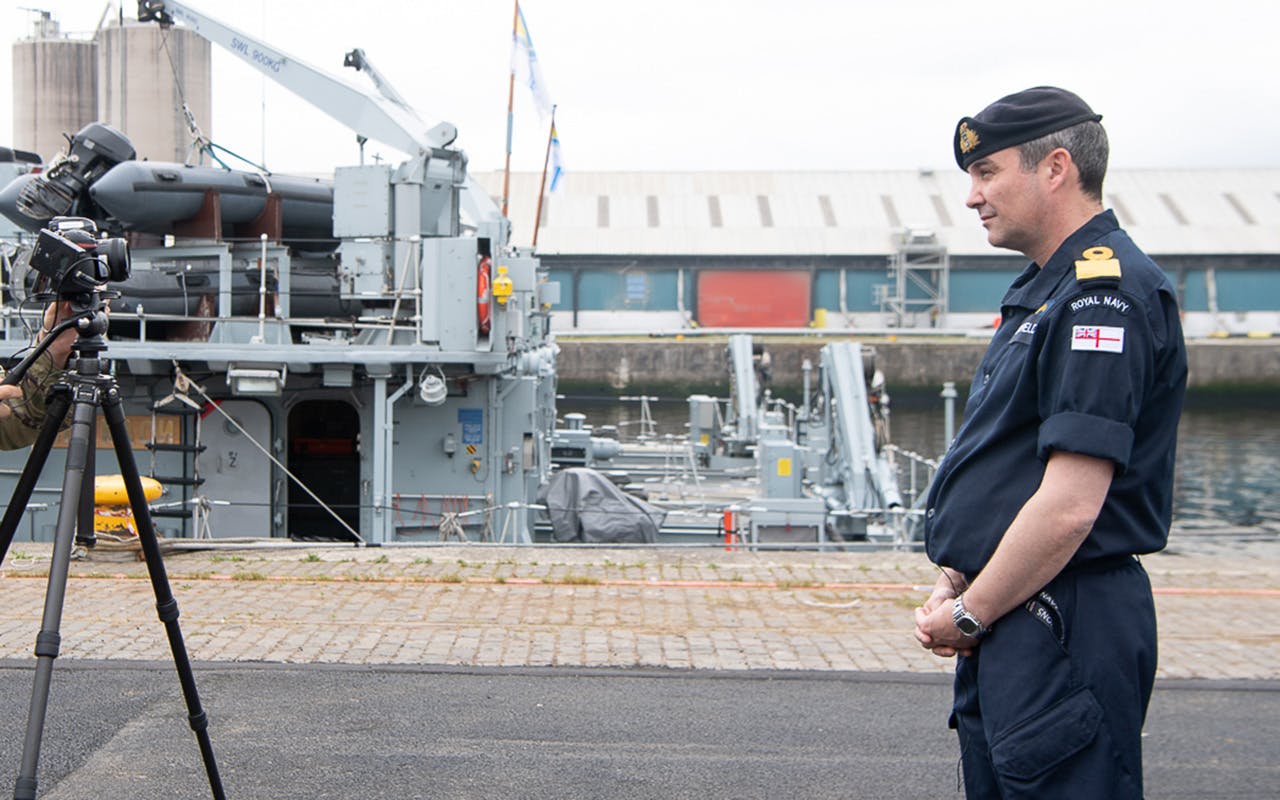We stood on the dock beside the Ukrainian ships, and Banfield shared his thoughts on the importance of Ukraine’s involvement in NATO exercises like Sea Breeze.
When I asked Commodore Banfield why Ukraine’s participation in these exercises matters, he was clear. “The involvement of Ukraine is hugely important for us because this is but one small part of our support to our Ukrainian partners and allies in not only their fight today, but more importantly, their fight tomorrow,” he explained.
Banfield also discussed the strategic significance of the Black Sea, describing it as a key maritime hub with significant mine threats. “And you will be very aware, the Black Sea is a major strategic maritime hub, which has a significant mine threat problem at the moment,” he noted. While current geopolitical restrictions prevent Ukrainian ships from entering the Black Sea, Banfield expressed optimism about future collaboration.
“So, whilst the ships will be unable to enter the Black Sea until something changes with the Turkish straits, working with our Ukrainian allies, you can see in the future where we will be able to work together not only on the knotty problem of mine threat in the Black Sea, but more broadly,” he added.
I was curious about what role the UK might play in clearing mines from the Black Sea. Commodore Banfield was rightfully careful in his response, acknowledging that future maritime operations are hard to predict.
However, he suggested that should it decide to do so in future, the UK could be involved through advisory roles, training, or other forms of support to help secure the Black Sea. “I would envisage that some form of UK involvement, be it through advice, through training or something else,” he hinted.
Demining the Black Sea is a global effort
More broadly, Commodore Banfield had previously highlighted the importance of training and rehearsing alongside growing the capabilities of the Ukrainian Navy.
“Our ability to train and rehearse, whilst growing the capability of the Ukrainian Navy, will support the globally shared long-term goal of creating a safe and prosperous maritime environment in the Black Sea,” he stressed.
This, he explained, is essential not only for supporting Ukraine’s economy but also for ensuring the free flow of maritime trade. Banfield expressed his admiration for the crews of the Chernihiv and Cherkasy, noting how impressed and inspired he has been by their achievements.
“I have been hugely impressed and inspired by the crews of the Chernihiv and Cherkasy. The amount they have achieved in such a short period of time is truly remarkable,” he said.
Maritime Capability Coalition is making good progress
During his speech at the start of Exercise Sea Breeze, Banfield welcomed representatives from numerous countries, highlighting the international nature of the exercise.
He praised the hard work and dedication of the Ukrainian crews, noting that the exercise marked the culmination of two years of intense preparation and training. “This exercise is the culmination of two years of hard work,” he stated.
Banfield underscored the broader implications of the exercise, pointing out the massive task ahead in demining the Black Sea. “Ukraine, supported by the Allies, faces a huge task: demining an estimated over 800 square kilometres of minefields in the Black Sea,” he noted.
He also highlighted the global importance of this effort, as Ukraine’s maritime trade supports both its economy and the global food supply. “Ensuring the free flow of trade to and from Ukrainian ports through the demining of Ukrainian waters is a truly global issue,” Banfield emphasised.

He further recognised the formation of the Maritime Capability Coalition, which aims to develop a fully capable Ukrainian Navy that can operate seamlessly with both Black Sea and international allies.
“Through the assistance of the Maritime Capability Coalition, we can make good progress and good progress is being made on this journey,” Banfield said, expressing confidence in the exercise’s ability to enhance interoperability and build stronger ties among participating nations.
Commodore Banfield has had a distinguished career in the Royal Navy since 2002, taking on various significant roles. From his early days as Officer of the Watch on HMS Cumberland to commanding HMS Iron Duke, Banfield has built a wealth of experience. His involvement in strategic planning and operational roles, including his current position as co-leader of the Maritime Capability Coalition, gives him a unique perspective on the importance of international naval cooperation.
His service history includes deployments in the Caribbean, the Gulf, and Basra, and he was recognised with an MBE in the 2016 Queen’s Birthday Honours. This rich background informs his understanding of the complex dynamics at play in NATO exercises and the broader maritime security landscape.
Reflections
My chat with Commodore Banfield offered valuable insights into Ukraine’s strategic importance in NATO exercises. It highlighted the balance of immediate support and long-term preparation needed to address maritime threats. His cautious optimism about future collaborations and the UK’s potential role underscores the ongoing commitment to maintaining security and stability in the Black Sea region.
The most striking takeaway from the event is that no one seems to doubt the war ending; everyone spoke optimistically, directly and indirectly, about demining the Black Sea once it’s over and Ukraine has defeated Russia.
